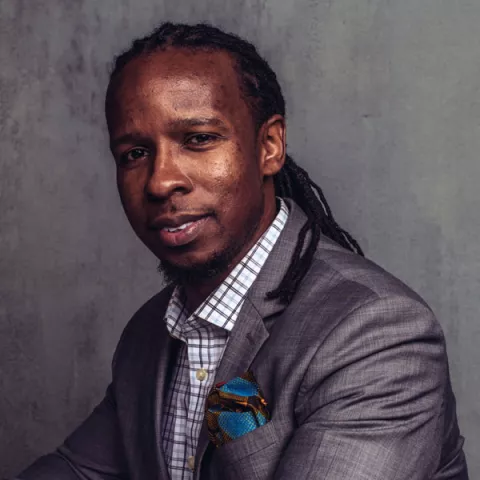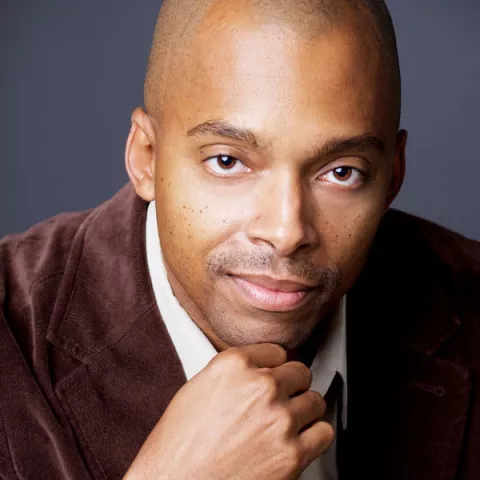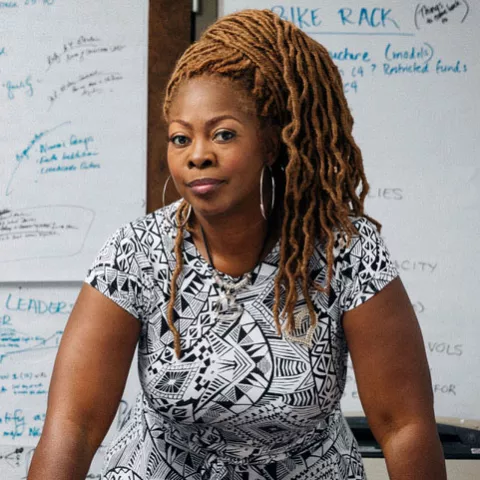The combination of art and activism took center stage at NEA’s 2021 Conference on Social and Racial Justice—and rightfully so. The art of protest, whether it’s social, racial, political, or economic, has long been a powerful form of expression that has led to small and big wins for some of the most marginalized groups of people in the United States.
Take music, for example. During the two-day conference, educators heard from several musicians who shared how their music is reflective of the world around them and brings light to social and racial justice. Members of the Resistance Revival Chorus, a collective of more than 60 women and non-binary singers who uplift and center women’s voices, underscored how music has always been at the core of resistance.
In a montage video, the group took educators through a series of social movements that has been infused with music. Music has “served to guide people, to uplift them, and to give them strength,” said one member of the group, from enslaved Africans who sang “follow the drinking gourd for the old man is a-waiting for to carry you to freedom” and those who sang songs of freedom during the Jim Crow era to workers who sang “solidarity forever…for the union makes us strong” during the labor movement of the early 1900s.
“We believe that art and culture change hearts and minds and that joy is an act of resistance,” said another member of the revival chorus.
And the conference certainly delivered a lot of joy, as well as inspiration and reflection.
The Root Cause of U.S. Inequities

Going from art to academics and activists, some of the featured guest speaker included Ibram X. Kendi, one of America’s foremost historians and leading antiracist scholars; Khalil Gibran Muhammad, who is widely known as one of the most influential authorities on racial justice in America; and LaTosha Brown, an award-winning organizer, philanthropic consultant, political strategist and jazz singer whose portfolio includes political empowerment, social justice, and civil rights.
Kendi shared how the coronavirus pandemic further exposed the inequities across all social sectors and the deep-rooted racism that too often leads many people to blame and shame those who were most impacted by COVID-19. “Anytime we explain away racial disparities or inequities by claiming it’s because the group on the lower end of the disparity is inferior, we are expressing racist ideas, and were commonly taught to do that.”

Underscoring this point was Chicago-born Khalil Gibran Muhammad, a professor of history, race, and public policy at Harvard Kennedy School. On day two of the conference, Muhammad said people must learn the truth about systemic racism.
“The history of our nation is a big source of learned bias,” Muhammad said, explaining that some history textbooks, children’s literature, museum exhibits, and monuments are among the “greatest sources of misinformation.”
He points to textbooks published by Macmillan that described enslaved people as immigrants, who simply came to join in the effort to make America great or books published by Scholastic that gave a “cheery and rosy view of slavery,” he said, such as the book, “A Birthday Cake for George Washington,” which was pulled from shelves in 2016.
The Harvard professor also emphasized the need to teach age-appropriate material to young students because “it’s obvious to me having taught young adult and graduate students for nearly twenty years that learning about systemic racism and other forms of group-based bias is much harder the older you get.”
The Power of the People

Additionally, educators and allies heard from LaTosha Brown, who helped get out the vote during the November and January elections in Georgia. Her organizing efforts and the work of Black Voters Matter, which aims to increase voter engagement and combat voter suppression, contributed to a historic turn out of more than 4.4 million people.
The pandemic changed the way organizers typically get people to the polls, “but we figured it out,” said Brown. “We found out that the most important capital we had was not going door to door…we had relationship capital…[and]… [plugged] into that ecosystem to… share information… encourage each other…[and]…build a collective vision.”
This collective vision is key as certain lawmakers from 48 states have introduced legislation intended to suppress the vote.
“But here we are, teaching our students…this idea that America is a democracy,” Brown said. “Let me tell you, … democracy, it has been aspirational, but it has not yet been achieved, which means we still got work to do.”
And this work includes educators, who have the power to help transform lives and create a more just and inclusive society.
Learn how you can help fight against voter suppression at educationvotes.nea.org.
Message from NEA President
When Becky Pringle was elected NEA president in 2020, the country’s racial and social inequities were in full view, painfully raw, and vividly undeniable, she said.
“I knew for us to truly prepare every student in every zip code to thrive, educators, parents, students, and allies would need to join together to ensure public education fulfills its promise,” Pringle said. “I know that’s possible…because we have joined together to win for our students before.”
Pringle referred to the #RedForEd movement, which brought together students, neighbors, families, and friends to demand and win funding for new textbooks and technology, infrastructure, increases in educator pay, and even recess time.
She pointed to the passion and power educators wield to ensure every student can pursue their dreams, chase their curiosity, and to live into their brilliance,
“We have the power to stop Asian hate …realize justice for Black lives… ensure this nation creates an immigration process that is fair and comprehensive…support LGBTQ+ youth and educators,” she said. “We have the power to ensure that when the story of America is told, the culture and contributions of Native Americans are an essential part of that telling. This is our time.”
And educators are tapping into NEA resources to realize this vision.
Community Advocacy and Partnership Engagement
Featured throughout the two days were several NEA-affiliated members who showcased how their working toward a more just and inclusive environment.
In Canton, Mass., for example, educators—in collaboration with their local union—created an Asian American Pacific Islander (AAPI) Educators Mentoring Educators program to support aspiring teachers, who are granted access to classrooms, as well as school, union, and community activities. The goal, in part, is for participants to gain a deeper understanding of how public education works and support racial and social justice activities.
Three years ago, in Alhambra, Calif., the story goes that when an unused classroom at Alhambra High School became available, two student clubs took the opportunity to use it as a safe space for immigrants and domestic-born students to gather. Soon after, the Dream Center was born.
It has since evolved to empower more youth and parent organizers to advocate for the rights of undocumented youth and families in immigrant rights and its intersection with housing, education, criminal justice, health care, labor, and the environment.
In a video message, Jocelyn Cooper, and immigrant student at Alhambra High School says she visits the Dream Center because “it’s a place where I feel safe. I can meet people [with] similar situation as me…and get the resources I need.”
Angelica Reyes, an undocumented educator who teaches world history and ethics studies in Los Angeles, Calif., spoke of her involvement with the Dream Center in her area: “I believe in social justice…and so I think that as an educator, it’s my job, when I’m teaching history, to make [students] feel seen, to make them feel powerful, and to make them feel loved. The Dream Center helps me do that.”
This work is funded, in part, by NEA’s Community Advocacy and Partnership Engagement (CAPE) Department, which provides grants to help inspire organizing and change for communities of color with other local and state affiliates. To learn more about CAPE grants and other opportunities visit nea.org.
The Work Must Go On
While the NEA Conference on Social and Racial Justice may be over, the work continues. Be on the lookout for the Summer Justice Series, a dynamic lineup that will feature sessions on transforming policing policies for safe and just communities; healthy and strong communities and schools; empowering communities and schools; and ensuring the right to vote for Black, brown, Native and AAPI voters. Visit neaedjustice.org/seasonofjustice for more information and to register for sessions.

